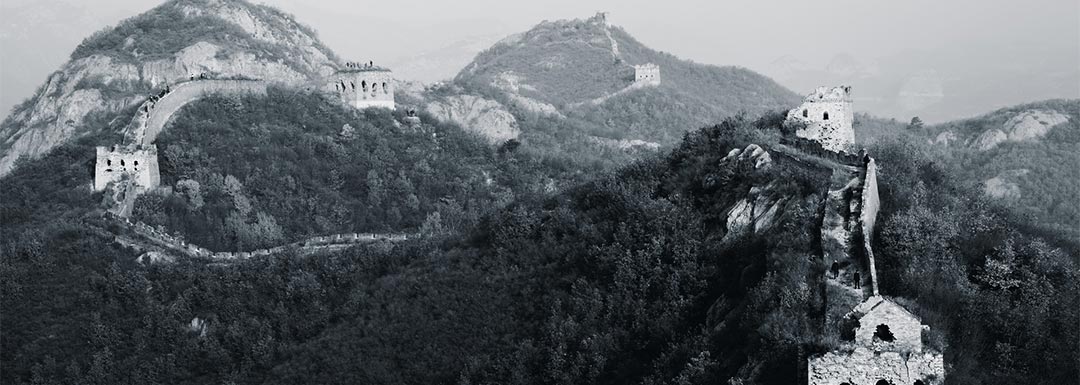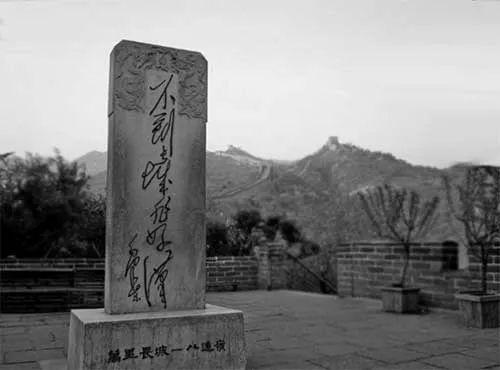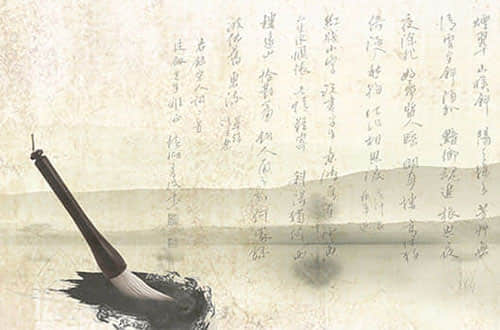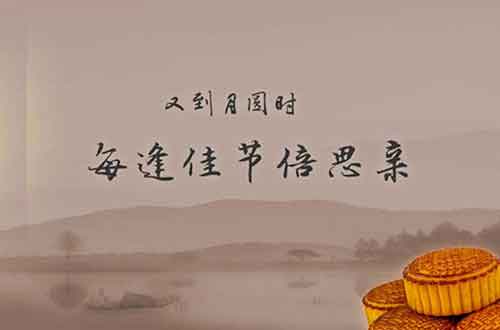2 Poems about the Great Wall of China

As a cultural icon of China, the majestic Great Wall has aroused people’s creative inspiration since ancient times, and some poems have become widely shared. For your enjoyment and admiration, here are two poems about the Great Wall:
Mountain Liupan — to the tune of Qing Ping Yue
Qīng píng lè liù pán shān
清平乐·六盘山

HAO HAN Monument on the Badaling Great Wall
Máo zé dōng
毛泽东
By Chairman Mao
tiān gāo yūn dàn
天高云淡, The sky is clear and the clouds are pale,
wàng duàn nán fēi yàn
望断南飞雁。
Look at the wild geese flying towards the south.
bú dào cháng chéng fēi hào hàn
不到长城非好汉,
A man cannot be a hero unless he climbs up to the Great Wall.
qū zhǐ xíng chéng è wàn
屈指行程二万。
The journey distance is about twenty thousand li.
liù pán shān shàng gāo fēng
六盘山上高峰,
At the crest of the Mountain Liupan
hóng qí màn juān xī fēng
红旗漫卷西风。
A red flag flutters in the west wind
jīn rì cháng yīng zài shǒu
今日长缨在手,
Today the long cord is held in hands,
hé shí fù zhù cāng lóng
何时缚住苍龙?
When shall we bind fast the blue Dragon?
Good to know:
A “li” is half of 1km, Mao had journeyed 10,000 km on his warpath by 1935.
The “Blue dragon” hints at Kuomintang at that time.
The background of this poem is that the red army conquered the enemies’ cavalry and climbed over the Mountain Liupan. It expresses their resolution to overthrow the Kuomingtang and Japanese imperialism.
On the Frontier
Chū sài
出 塞
Wáng chāng líng
王昌龄
By Wang Changling
qín shí míng yuè hān shí gāun
秦时明月汉时关,
The moon still shines over the mountain pass of the Han dynasty as of yore.
wàng lǐ cháng zhēng rén wèi huán
万里长征人未还。
Many warriors at war could not come back home anymore.
dàn shǐ lóng chéng fēi jàing zài
但使龙城飞将在,
If the Flying General Li Guang were still in command,
bú jià hú mǎ dù yīn shān
不教胡马度阴山。
No hostile steeds would have dared to invade our land.
Good to know:
Li Guang (died 119 BC), born in Tianshui, Gansu, was a general of the Western Han dynasty. Nicknamed the "Flying General" by the nomadic people, he fought primarily in the campaigns against the nomadic Xiongnu tribes to the north of China. He was known to them as a tough opponent when it came to fortress defense.
Wang Changling was a major poet in the Tang Dynasty when it was the most prosperous period. However, the wars at the frontier had been prolonged for a very long time without any good news, and the troops had suffered losses. He worried and was eager for success and peace, so he wrote this poem. Even though in the period of strong national power, there was no one as courageous as General Li Guang who could frighten enemies. Each verse voiced his intended hope for victory and peace.
Drop us a line and we'll connect you with the top China expert in no time!
 Chinese Poetry
Chinese Poetry  Poems About Yellow River
Poems About Yellow River  3 Chinese New Year Poems
3 Chinese New Year Poems  2 Popular Chinese Mid-Autumn Festival Poems
2 Popular Chinese Mid-Autumn Festival Poems